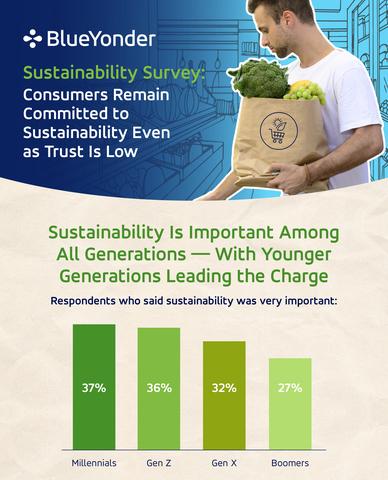How important is sustainability to shoppers?
A new survey reveals consumer habits and preferences for environmentally-friendly shopping.
Sustainability remains a top priority for consumers, with 78% of respondents reporting that sustainability concerns are very or somewhat important to them when choosing to buy a product or shop at a retailer, according to results of the third annual Blue Yonder Consumer Sustainability Survey.
Seven-in-10 respondents indicated that they have shopped at a retailer promoting their products as sustainable at least once or more in the past six months, which is slightly down from the 74% who reported doing so in the 2023 and 2022 editions of the survey.
Close to half (47%) of respondents reported that their interest in shopping sustainably has greatly or slightly increased in the last year, while 40% of respondents said they would pay up to an additional 5% and 25% said they would pay an additional 10% or more.
More than eight-in-10 (83%) respondents reported that they are willing to delay deliveries if an incentive is given to do so. However, only 23% of respondents said they were willing to delay a delivery by a week or more.
Nearly half (47%) of respondents also said they would be likely or very likely to pay more for “greener” shipping options such as lower carbon footprint delivery and sustainable packaging.
Younger consumers value sustainability more
Sentiments toward sustainable delivery differed by generation. Millennials (85%) are the most likely to delay product delivery, followed by Gen Z (79%), Gen X (76%) and baby boomers (67%).
More broadly, the survey found that Gen Z and millennials are most concerned with sustainability, with 85% and 84%, respectively, reporting that sustainability considerations are important to them.
In addition, millennials (37%) and Gen Z (36%) were most likely to say sustainability considerations are “very” important to them, followed by Gen X (32%) and baby boomers (27%).
Consumer trust in sustainability efforts varies
Nearly half (48%) of respondents said they can only “sometimes” trust a brand’s sustainability claims, depending on its message, brand reputation and history. More than one-third (35%) of respondents said they do not trust brands’ claims, citing the need for their own additional research (21%) and the belief that brands tout sustainability regardless of whether it aligns with their actions (14%).
Other key findings:
- Six-in-10 (59%) respondents reported increased purchasing sentiment toward online shopping with delivery companies who invest in electric trucking to deliver orders.
- More than half of respondents said that they incorporated sustainable food products (60%) and household products (55%) into their shopping habits in the past year.
"We’re encouraged to see that the majority of consumers take sustainability into account when making purchasing decisions," said Saskia van Gendt, chief sustainability officer, Blue Yonder. "It’s especially promising that so many respondents are willing to spend more for sustainable products, given that price concerns, exacerbated by the ongoing challenge of inflation, have marked conversations around consumer behavior over the last year. Their willingness to spend more should send a clear message to brands and retailers that investing in sustainable solutions and practices is worthwhile, not only for the planet but also for maintaining consumer loyalty and trust."
Blue Yonder collected responses between Feb. 21-22, 2024, from more than 1,000 U.S. consumers age 18 and up.



